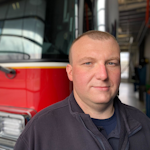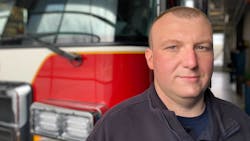What happened to the days of being a mentor? Today, as I walk into the fire station, I see all the bright lights, the big, shiny rigs, and all the personnel doing their own thing to get ready for their shifts. When I talk to new firefighters, I often hear stories about their lives, how they became involved in the fire service, and what their goals for the future are. Surprisingly, I seldom hear stories about mentors or people who have influenced them to join the fire service. Even as a volunteer firefighter, it was more common to hear a story about someone in their lives leading them toward the fire service.
I've heard numerous stories of a firefighter reaching out and changing someone's life because they were a positive influence. But nowadays, it seems that being a celebrity or athlete, or obtaining large sums of money or the prestige that comes with fame, are what convince many young people to follow a certain career path. I myself ended up as a firefighter by happenstance.
After high school, I had goals of becoming a wealthy attorney, but I dropped out of college during my freshman year and started a career as a police dispatcher. I quickly realized that I was a student who never had to crack a book in high school but had to work hard to gain that knowledge in college. I later joined a volunteer fire department simply because it was across the street from my house. I was originally too scared to even walk into the fire station until my wife talked me into it. Those simple steps led to years of training and a career that makes me proud.
Ambassadors of our profession
As ambassadors of our profession, it is our responsibility to ensure that every member of the public who we come into contact with has a positive interaction with the fire department. We should be mentors to the public and be mentors to the new recruits just beginning their training. We need to show them the various, non-monetary ways that the career is rewarding. A fellow firefighter who mentored me and helped me realize the calling in my life once said, "You can learn a lot about the job, not just from your officers but from every person working in every seat. You can watch those others that you're with and learn their strengths and weaknesses and about becoming a leader."
How much have we learned from those whom we are around? How many of us know every detail about every person who works with us or at least on the shift or truck with us? We should all take the time to get to know our brothers and sisters who have chosen to make this profession a career. These are the people who have our back when things get tough and the people we will do anything for if their life is in danger.
When new people come in, we should welcome them with open arms. We should show them as much as we can about our jobs and teach them how to do things, especially if they are completely new to the career. We should inspire a passion for not only our career but our department as well. We should take a genuine interest in each other's hobbies, families, emotional and mental state, and level of training. Too many times we get caught up in the fact that we have a new coworker and they are new and different to us. We do not take the time to bond with them.
Over the last few years, it is estimated that between 17 and 22 percent of firefighters suffer from post-traumatic stress disorder (PTSD). In 2017, more firefighters and police officers died from suicides than line-of-duty deaths combined. All of this amid the fact we are three times more likely than the average person to be diagnosed with cancer. It is our duty to protect our brothers and sisters. We have a duty to act in getting to know new personnel. We have a duty to act in mentoring our brothers and sisters.
When we spend 24 hours at a time with each other, there is no excuse for not knowing the names of each other’s family members, how many kids we have or what's going on in our lives.
So, how can we positively affect change?
Steps for change
First, we need to identify our own strengths and weaknesses. If you are weak in leadership, now is the time to step out and improve on that. Make it a point to introduce yourself to the "new guy," find out about where he or she is from. Find out about their ambitions, goals, career desires, and what they have and have not done. Learn their children’s names, their struggles and what makes them come to work every day. Be a mentor. Winston Churchill said, “We make a living by what we get, we make a life by what we give.” What kind of life are we making? You do not have to be an officer to be a leader. Become a leader by being a positive example.
Second, be willing to be a lifelong student. Do you have a never-ending pursuit of learning? What you learned in rookie school is not going to teach you everything you need to know. Some firefighters learn the basics and think they are done. Pursue every course, certification, degree, seminar and license you can find. You can never learn too much in a career that kills nearly 100 of its members annually. Whether you are learning to stay alive or learning to be the best version of yourself, LEARN.
If you want a degree, seek out schools that offer degree paths that interest you. Look for schools that offer credit for learning already attained. Many schools offer credit for education already achieved through non-traditional sources. While working on your own education, seek out ways to help at least one other firefighter pursue an educational path that interests them, while also teaching them the career skills that they need.
Third, be genuine. Don't do all of this to further yourself, but do this to further others. If you help other people succeed but you never get promoted, you've still been successful. Genuinely help others because it’s the right thing to do. When we begin to put others first, we will feel better about ourselves, be more positive, and increase the morale of those around us. We will be seen as mentors, and this will eventually lead to firefighters watching out for each other, mentoring each other, and leading each other.
Ask yourself …
Are you going to be a mentor or let the new generation of men and women continue to uselessly follow dreams of fame and fortune?

Charles Powers
Charles Powers is a firefighter/AEMT in Pigeon Forge, TN. He is a recent Emergency Management graduate with high honors from Frederick Community College, in Frederick, MD. He is certified at the Fire Officer II, Fire Instructor II, Firefighter II and Hazardous Materials Technician levels. Prior to becoming a career firefighter, Powers was a police communications officer and police communications training officer. He was a volunteer firefighter with the Catons Chapel Richardson Cove Volunteer Fire Department, where he reached the ranks of captain and training officer. There, he successfully wrote and managed a variety of grants that included FEMA, state and private grants. He is currently pursuing his bachelor’s degree in public safety administration with a minor in emergency management at the University of Maryland University College.






